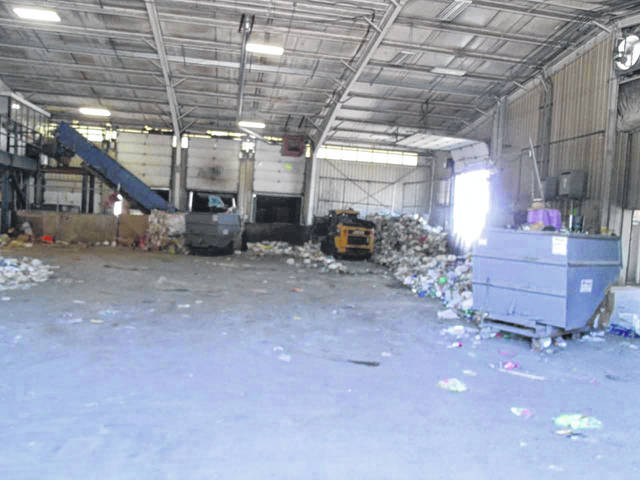
SIDNEY — Most people would probably agree — recycling is important to minimize the negative impact on the natural environment and to those living in it. Given the amount of trash coming into recycling centers, it appears many people may not know what materials are actually recyclable.
About 40 percent of all material brought to the Shelby County Recycling Center is contaminated, said Tim Metzner, operations manager of the North Central Ohio Solid Waste District (NCO).
According to NCO, the Joint County Board of Commissioners established the North Central Ohio Solid Waste Management District on March 16, 1989. NCO is comprised of Allen, Champaign, Hardin, Madison, Shelby and Union counties. NCO helps set recycling regulations based on state mandates.
“Just because it has that little triangle on there, doesn’t mean it’s recyclable because there is no market for it. Like Styrofoam, you have to have a mass quantity. How big is a ton of Styrofoam?” Metzner said.
When trash is mixed in with recyclable material, it contaminates the whole batch. Assistant City Manager/Public Works Director Gary Clough said if more than 1 percent of collected recyclable material is contaminated with trash, the whole bin could be taken to the landfill.
“If (people) throw one pizza box in (with recyclables), that contaminates the whole (recyclable) container,” Clough said. “Anything that has food particles on it is not recyclable.”
Uncontaminated cardboard, newspaper, magazines, office paper and common mail can be recycled. Cardboard or paperboard should be cut into pieces no larger than 2-feet by 2-feet. No. 1 or No. 2 plastic containers are the only acceptable types of plastic at the Sidney Recycling Center. Currently, only clear, green or brown glass bottles, or jars as well as aluminum, steel or bi-metal (tin/steel) cans are accepted. The lids on plastic bottles are trash. Food or drink cans, or plastic bottles should have paper or plastic labels removed and be rinsed out.
Clough said some people think plastic baby pools are recyclable because it is plastic, but he explained it is not the type of plastic that is acceptable. He also noted people will leave larger pieces cardboard sitting on the ground next to the recycling bin but if it rains (or even the morning dew) will ruin the cardboard. Wet paper or cardboard is not recyclable, Clough stressed.
Often times, Metzner said they see people using their recycling bins as trash cans after their trash bin becomes full. Workers at the recycling center said they see all types of trash come in, including dirty baby diapers. Those type of items, or items containing food particles can contaminate a whole bin or truck load, experts advised.
“In the market, there used to be a typical standard where you could have 10 percent contamination. Things that were not recyclable, they would pull out no more than 10 percent. Because of the markets with China, which was probably the biggest market for recyclables, they got a lot tougher, because their economy is struggling. The contamination content is down to 1 percent now,” Clough said.
Mayor Mike Barhorst noted in his column last December that “in 2013, China made the first of a series of policy changes designed to reduce the amount and types of recyclable materials allowed into their country. Then in July 2017, China announced that they would no longer import 24 different kinds of materials, including mixed paper and mixed plastics.”
Barhorst explained that China’s ban went into effect on Jan. 1, 2018, and then was quickly followed by a policy limiting contamination to 0.5 percent.
Clough said if people are putting items that should not be in recycling bins, they are not recycling and that it is actually going to the landfill and therefore they are not protecting the environment.
“(Trash) is not only contaminating their (recycling bin), but if we have enough people contaminate, it will contaminate the whole truck load and that whole truck load will go to the landfill,” Clough said.
According to data from the United States Environmental Protection Agency (USEPA):
• Recycling one ton of office paper can save the energy equivalent of consuming 322 gallons of gasoline.
• Recycling just one ton of aluminum cans conserves more than 152 million Btu, the equivalent of 1,024 gallons of gasoline or 21 barrels of oil consumed.
• Plastic bottles are the most recycled plastic product in the United States as of 2015, according to USEPA’s most recent report. Recycling just 10 plastic bottles saves enough energy to power a laptop for more than 25 hours.
Clough said the city recently re-launched a free new phone app called Recycle Coach that provides information about what can and cannot be recycled, as well as a calender schedule of when the recycling pick up dates are. He encourages residents to download the free app to help track solid waste collection schedules. The app sends out notifications to a subscriber’s phone about any pick up changes occur. A link to the app is available on the city’s website at http://www.sidneyoh.com/Solid-Waste/index.asp or it can be found at the app store on a smartphone.
Anyone with questions about what can be recycled, including other types of items, such as electronic or hazardous waste, information can be found on the Recycle Coach app, visiting NCO’s webpage https://www.ncowaste.org/Shelby_County_Recycling_Center.html . NCO can be reached by phone at 937-498-7351.
In the city of Sidney, recyclables may be placed in a 35-gallon blue cart provided by the city to be picked up every other week by Republic Services on the same day the neighborhood’s trash is collected. The Sidney Public Works Department can also answer solid waste questions at 937-498-8141.


